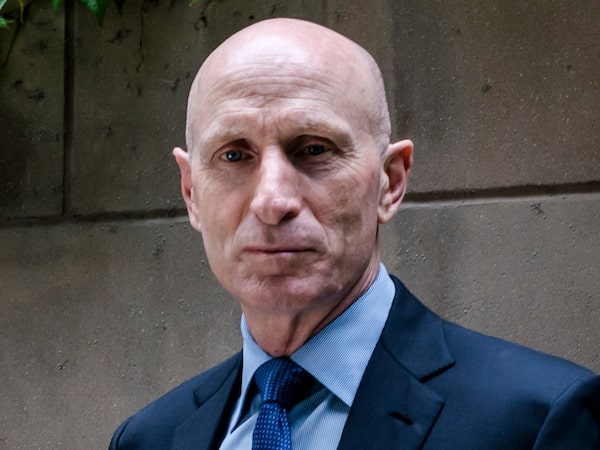Ontario Premier Doug Ford ousted the board of directors and CEO at Hydro One Ltd. by threatening to rip up executive employment contracts at the utility, an aggressive approach that is expected to make it difficult to draft a new leadership team.
Mr. Ford’s Progressive Conservative government drafted legislation shortly after being elected last month that would have scrapped existing agreements between Hydro One and senior executives such as then-CEO Mayo Schmidt, according to Ontario government sources who are not authorized to speak to the media.

Mayo Schmidt in 2017.Christopher Katsarov
Faced with the potential loss of Hydro One stock options and other equity compensation that are currently worth about $9-million, Mr. Schmidt opted to “retire” on Wednesday with a $400,000 lump sum payment, while the 14-member board resigned. One source familiar with the talks said the government used the nuclear option, telling Mr. Schmidt and the board members to negotiate or see their contracts shredded.
The draft legislation was draconian, according to another government source, who said elements of the new policy are expected to be introduced by the PCs as part of their campaign to bring down electricity rates.
Read more: Retiring Hydro One CEO can get $9-million compensation package, Globe analysis reveals
Opinion: Doug Ford kneecaps Hydro One
Doug Ford Year One: A guide to what’s happening in the new Ontario
During the recent provincial election, Mr. Ford harshly criticized Mr. Schmidt’s pay package, linking compensation at the utility to rising power costs and promising to fire the “$6-million man.” Under his contract, Mr. Schmidt was entitled to more than $10-million in severance.
Hydro One executives declined to comment on the circumstances surrounding his departure and the board’s resignation. When asked about the compensation paid to Mr. Schmidt, government spokesman Simon Jefferies said: “Premier Doug Ford and the government for the people will always put the ratepayers and taxpayers first. When the Minister of Energy accepted the CEO of Hydro One’s resignation, it was ensured that ratepayers would be protected.”
The leading candidate for the top job at Hydro One is current Toronto Hydro CEO Anthony Haines, according to government sources. Regulatory filings show Mr. Haines earned $1.1-million last year. Meanwhile, Paul Dobston, Hydro One’s chief financial officer, is the acting CEO.
Hydro One and Toronto Hydro had no comment on their respective leaders.
The Energy Ministry said Wednesday that it would table legislation to increase “transparency and accountability” at Hydro One in the coming legislative session. The government is expected to propose sweeping changes to the way the utility pays its top executives. The package will include the disclosure of compensation for as many as 20 top executives; currently, Hydro One and other public companies only disclose the pay packages for their top five employees. The government is also expected to cap CEO pay at levels typically seen at provincially owned agencies – even though the province partly privatized Hydro One in 2015 and currently owns just a 47-per-cent stake.
For its part, Hydro One announced Wednesday that it plans to name a new board with 10 members, plus the new CEO, and has set a deadline of Aug. 15 for announcing candidates. The government will name four of those directors, while a group comprised of the utility’s largest institutional shareholders, including Mackenzie Financial Corp., Bank of Nova Scotia and CI Investment Inc., will nominate the other six.
But the prospect of joining the board or hiring a new CEO while the rules are being rewritten will make recruitment difficult. “We see this move as creating a great amount of uncertainty for the stock,” said a report from analyst Robert Kwan at RBC Dominion Securities Inc., who downgraded his target price on Hydro One to $21 from $25. “Questions include: Who will be the next CEO? And with the government’s eye on compensation, will the board be able to attract a suitable candidate?”
Hydro One’s stock price closed Thursday down more than 3 per cent at $19.46 on the Toronto Stock Exchange, after declining steadily from approximately $22 during the election campaign. Investment banking analysts said turmoil among its leadership could scupper Hydro One’s planned $6.7-billion takeover of U.S. utility Avista Corp., which was announced a year ago.
“We believe the resignation of the CEO [and] board is a negative development, particularly given that Hydro One is likely in the late innings of the regulatory approval process for the Avista deal,” said Ben Pham at BMO Nesbitt Burns Inc.
CIBC World Markets Inc. analyst Robert Catellier also cut his target price on Hydro One shares, to $20.50, and said in a note to clients that the decision to replace the CEO and board “indicates the government is willing to meddle. Just as worrisome is the possibility that the government meddles with the company’s rates in some form, potentially impacting earnings.”
 Andrew Willis
Andrew Willis